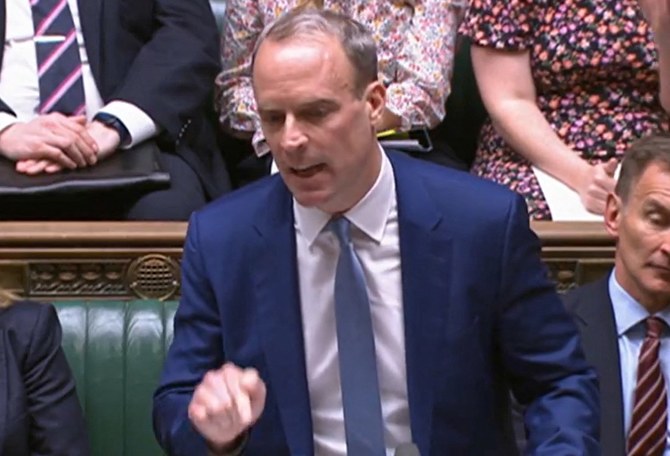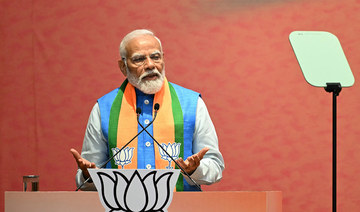LONDON: The UK government has been criticized after the deputy prime minister claimed it had established safe routes for refugees and asylum-seekers to enter Britain.
Speaking to the BBC, Dominic Raab claimed there were “safe and legal” ways for people fleeing Afghanistan to reach the UK.
The UK deputy leader was responding to questions about a former Afghan Air Force pilot facing deportation to Rwanda after having arrived in Britain via countries deemed safe.
The pilot, who has not been identified out of concerns for the safety of his family in Afghanistan, claimed there were no safe routes, and that he was forced to enter the UK illegally in a small boat across the English Channel.
Raab said: “I don’t want to comment on individual cases. It’s sensitive, it’s not right.”
But asked if it was right to deport people who had fought alongside coalition forces against the Taliban, he added: “That’s why we created a safe and legal route. Getting out of the country has been difficult in Afghanistan. Thousands have; we set up the flights before the evacuation of Kabul, but others can do it via neighboring countries. So there is a safe and legal route for Afghans.”
Raab’s fellow Tory MP and the chair of the UK’s Defense Select Committee, Tobias Ellwood, disagreed, telling The Independent there was “no functioning process” for Afghans to reach the UK, and adding that Britain had a “duty” to those who had worked alongside it in the country — a sentiment echoed by the former head of the Royal Navy, Admiral Lord West.
The UK has two schemes for Afghans seeking asylum. The Afghan Relocations and Assistance Policy for those who assisted British forces in Afghanistan has brought over 11,000 people, while the Afghan Citizens Resettlement Scheme is for general applications.
The latter has managed to resettle just 22 people since the end of the UK’s military-led evacuation process, Operation Pitting, in 2021, while the ARAP scheme has over 4,300 eligible people still stuck in Afghanistan.
Afghans, meanwhile, make up the largest single cohort of people crossing the English Channel illegally in small boats, with over 9,000 making the journey in 2022.
Yvette Cooper, Labour’s shadow home secretary, told The Independent: “The UK government made a solemn promise to the Afghans who helped our armed forces that it would help them and give them sanctuary from the Taliban.
“The failures of this Conservative government to help those that helped us is a source of national shame.”
The pilot, who flew over 30 combat missions against the Taliban and was praised by his Western colleagues as a “patriot to his nation,” believes he has been “forgotten” by his US and UK comrades, adding that it was “impossible” to reach the UK safely and legally under either of the present schemes.
Questioned about the case by a parliamentary committee on Tuesday, UK Prime Minister Rishi Sunak described the pilot and others like him as “exactly the sort of people we want to help,” adding that he would “happily” ask the Home Office to reassess the case.
Raab, UK foreign secretary during the period when the Taliban retook control of Afghanistan following the withdrawal of coalition forces, also suggested on Wednesday that the UK could house asylum-seekers offshore on giant ships to end the “perverse incentive” of putting people up in hotels indefinitely.
The now deputy PM notoriously initially refused to curtail a holiday as the chaotic situation in Kabul unfolded in 2021, leading to a backlash against the UK’s handling of the withdrawal at home. The UK Foreign Affairs Committee later found that he had attempted to shift the blame for the “disaster” in its aftermath.




























